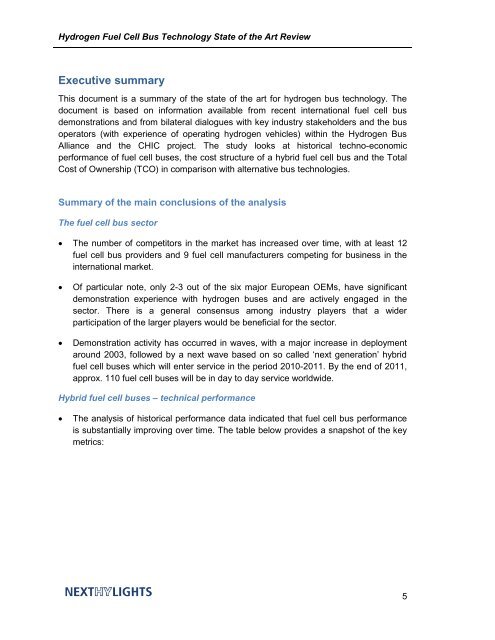Hydrogen Fuel Cell Bus Technology State of the ... - NEXTHYLIGHTS
Hydrogen Fuel Cell Bus Technology State of the ... - NEXTHYLIGHTS
Hydrogen Fuel Cell Bus Technology State of the ... - NEXTHYLIGHTS
You also want an ePaper? Increase the reach of your titles
YUMPU automatically turns print PDFs into web optimized ePapers that Google loves.
<strong>Hydrogen</strong> <strong>Fuel</strong> <strong>Cell</strong> <strong>Bus</strong> <strong>Technology</strong> <strong>State</strong> <strong>of</strong> <strong>the</strong> Art Review<br />
Executive summary<br />
This document is a summary <strong>of</strong> <strong>the</strong> state <strong>of</strong> <strong>the</strong> art for hydrogen bus technology. The<br />
document is based on information available from recent international fuel cell bus<br />
demonstrations and from bilateral dialogues with key industry stakeholders and <strong>the</strong> bus<br />
operators (with experience <strong>of</strong> operating hydrogen vehicles) within <strong>the</strong> <strong>Hydrogen</strong> <strong>Bus</strong><br />
Alliance and <strong>the</strong> CHIC project. The study looks at historical techno-economic<br />
performance <strong>of</strong> fuel cell buses, <strong>the</strong> cost structure <strong>of</strong> a hybrid fuel cell bus and <strong>the</strong> Total<br />
Cost <strong>of</strong> Ownership (TCO) in comparison with alternative bus technologies.<br />
Summary <strong>of</strong> <strong>the</strong> main conclusions <strong>of</strong> <strong>the</strong> analysis<br />
The fuel cell bus sector<br />
The number <strong>of</strong> competitors in <strong>the</strong> market has increased over time, with at least 12<br />
fuel cell bus providers and 9 fuel cell manufacturers competing for business in <strong>the</strong><br />
international market.<br />
Of particular note, only 2-3 out <strong>of</strong> <strong>the</strong> six major European OEMs, have significant<br />
demonstration experience with hydrogen buses and are actively engaged in <strong>the</strong><br />
sector. There is a general consensus among industry players that a wider<br />
participation <strong>of</strong> <strong>the</strong> larger players would be beneficial for <strong>the</strong> sector.<br />
Demonstration activity has occurred in waves, with a major increase in deployment<br />
around 2003, followed by a next wave based on so called „next generation‟ hybrid<br />
fuel cell buses which will enter service in <strong>the</strong> period 2010-2011. By <strong>the</strong> end <strong>of</strong> 2011,<br />
approx. 110 fuel cell buses will be in day to day service worldwide.<br />
Hybrid fuel cell buses – technical performance<br />
The analysis <strong>of</strong> historical performance data indicated that fuel cell bus performance<br />
is substantially improving over time. The table below provides a snapshot <strong>of</strong> <strong>the</strong> key<br />
metrics:<br />
5


